Brazil Targets Illegal Bitcoin, Stablecoin Use Through New Proposals
November 12, 2025
In brief
- Brazil’s central bank has said that any purchase, sale or exchange of virtual assets pegged to fiat currency will be considered a foreign exchange operation.
- President Luiz Inácio Lula da Silva sent a bill to congress allowing for the seizure of virtual assets and other property.
- Brazil’s central bank President Gabriel Galipolo raised concerns earlier this year about stablecoin use.
Digital asset hotspot Brazil is trying to crack down on criminal use of crypto through separate legislative and regulatory proposals issued by the government and central bank this month.
A rule proposed by the country’s central bank on Monday would make it easier to target illegal stablecoin use by creating authorization requirements for currency exchanges, including crypto trading platforms. The rule says that any purchase, sale or exchange of virtual assets pegged to fiat currency would be deemed a foreign exchange operation.
“BCB Resolution 521 establishes rules for some activities of virtual asset service providers (VAPs), which are now treated as foreign exchange and international capital market operations,” the rule reads on the bank’s website.
The central bank proposal comes after President Luiz Inácio Lula da Silva sent a bill to the country’s congress that would allow authorities to seize property—including “virtual assets”—during investigations and convert them into fiat currency.
“In the case of seizure of foreign currency, bonds, securities, checks issued as payment orders, or any other instruments representing value or virtual assets, the judge will order their conversion into national currency,” the bill, which still needs to be approved by congress, reads.
Brazil’s central bank President Gabriel Galipolo has raised concerns about the difficulties of tracking stablecoin use.
Galipolo in February said that crypto use “maintains some kind of opaque vision for taxation or for money laundering.”
Stablecoins are digital tokens pegged to non-volatile assets—usually U.S. dollars—that can be used to make quick transactions.
Brazil, Latin America’s biggest economy, is the region’s biggest digital asset market, and has the largest number of crypto ETFs, including funds tracking Bitcoin, Ethereum, Solana and other tokens.
A high-ranking official in the ruling administration earlier this year said that a potential strategic Bitcoin reserve would be “determinant for our prosperity.”
Daily Debrief Newsletter
Start every day with the top news stories right now, plus original features, a podcast, videos and more.
Search
RECENT PRESS RELEASES
Meta Shares Tips on How to Use its Click-to-Message Ads
SWI Editorial Staff2025-11-13T06:03:33-08:00November 13, 2025|
The Big Short’s Big Bet
SWI Editorial Staff2025-11-13T06:03:09-08:00November 13, 2025|
Ørsted cuts carbon emissions by 98%
SWI Editorial Staff2025-11-13T05:33:54-08:00November 13, 2025|
Latest News In Energy Transition – China’s Renewable Energy Surge Driven By Government and
SWI Editorial Staff2025-11-13T05:33:34-08:00November 13, 2025|
Atlas Renewable Energy opens 201-MWp Shangri-La solar farm in colombia
SWI Editorial Staff2025-11-13T05:33:08-08:00November 13, 2025|
Latest News In Energy Transition – China’s Renewable Energy Surge Driven By Government and
SWI Editorial Staff2025-11-13T05:32:44-08:00November 13, 2025|
Related Post


